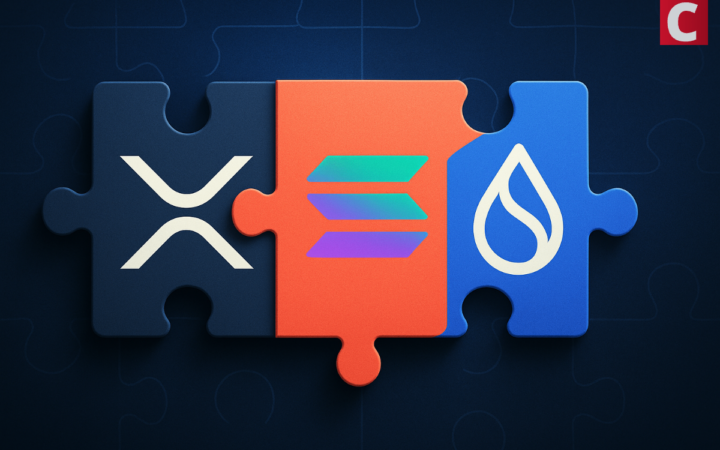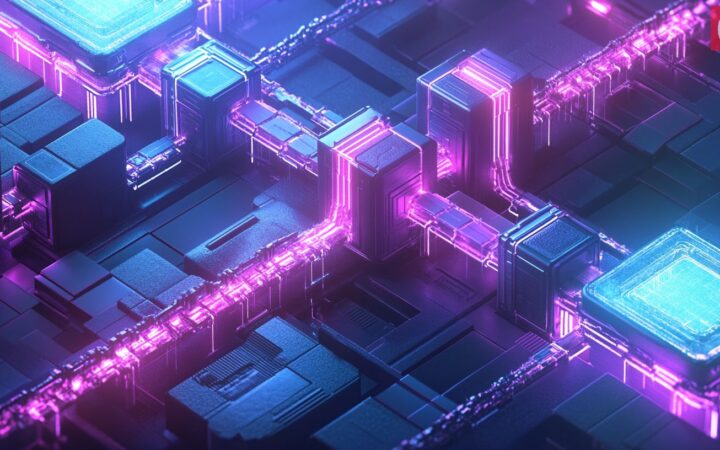
Christopher Haruna Hamman is a Freelance content developer, Crypto-Enthusiast and tech-savvy individual. He is also a Superstar Content Developer, Strategy Demigod, and Standup Guy.
The supply chain and logistics industry seems to be doing well at the moment. However, can it do more? Blockchain technology provides a way to do this and the Quras blockchain is the solution to be applied.

Valued at $8.1 trillion today, the global supply chain and logistics industry is the backbone of our global economy. With the emergence of blockchain technology, this industry can become more efficient and profitable than ever before thanks to increased transparency, speed, and accountability. And the Quras blockchain is emerging as a notable protocol for enterprises to build on in the supply chain industry.
The supply chain and logistics industry has been primed for disruption since the dawn of the new millennium. For decades, a lot of the same issues have plagued the supply chain across almost every industry, from medical devices and food to retail and commodities. Issues include a lack of supply chain visibility, security risks, lack of qualified workers, and increasing customer demands.
Theses issues have caused nightmares for major organizations, with losses ranging from hundreds of thousands to multiple millions of dollars. The introduction of emerging technologies, including artificial intelligence, robotics, internet of things, machine learning, and blockchain, have changed the outlook of the supply chain and logistics industry. Automated systems have created a paradigm that at worst ensures that the basic deliverables are met in any kind of scenario.
However, these next-gen supply chain systems have come with complications of their own that have yet to be resolved. As Scott Sopher, leader of Deloitte’s Global Supply Chain practice, eloquently put it “The digital, interconnected world demands that supply chains also serve as a connected, coordinated information ecosystem that delivers maximum flexibility, visibility, and transparency.”
The supply chain and logistics industry has many facets that need to be considered critically, both individually and as a whole. As the global economy continues to keep pace with innovative digital technologies and automation, we’re seeing constraints on supply chain unlike ever before. Many supply chain and logistics decision-makers are hitting technology adoption barriers due to a lack of clear business use cases, a lack of workforce talent, a lack of trust when sharing information across their supply chain, and a lack of understanding the technology landscape itself.
The following trends and forecasts need to be considered when looking at the present and future of the industry:
While the above statistics point to a bright future for the industry, the industry can become so much more. The benefits of technology in our global supply chain has already been proven many times over; optimized operations, efficiency gains, additional competitive advantages, and better customer relationships. Nonetheless, a shortening product lifecycle and rising customer demands have placed massive demand on our supply chains and logistics infrastructure, increasing the importance of speed and flexibility in supply chains. There is a lack of control of upstream and downstream logistics, coupled with high costs of technology integrations and inefficient visibility into the end-to-end supply chain itself.
This is why the situation needs to considered from an entirely different perspective. The industry must become more nimble in adopting new processes and technologies in order to meet the real-time demands of the consumer while keeping a pulse on the market. If supply chain and logistics companies fail to change and grow through innovation, they will lose their competitive edge while being pushed aside by those that have evolved with the changing landscape of the global economy.
Centralized supply chain solutions have been commonplace for quite some time now, but they carry many inherent flaws. For one, centralized systems, where data is kept in well-guarded silos and not shared across a supply chain, have lead to a fragmented logistics network of carriers, drivers, warehouses, and brokers. Also, centralized systems have led to a lack of transparency in the supply chain, issues with tracking goods, and a lack of accountability between the various players in the ecosystem, leading to +$30 billion of cargo theft losses annually in the U.S. alone.
Decentralized solutions, on the other hand, will usher in the next generation of the global supply chain industry through transparency, scalability, and security. For starters, blockchain ledgers are immutable, enabling all transactions to be marked with a timestamp which can help with supply chain audits while stopping product counterfeits and theft of goods. A decentralized ledger eliminates the reliance on third parties that we place to facilitate trust between partners up and down the supply chain while reducing security costs. Tracking provenance and traceability with blockchain will help resolve disputes faster while enabling real-time accountability without sacrificing confidential data that may be kept by one party or another. Additionally, a distributed and decentralized database increases security of the supply chain while allowing error-free flow of goods thanks to smart contracts. The digitalization of documents and workflows will reduce delays and human error in paperwork while still being compliant with regulations.
And finally, blockchain technology can allow concurrent optimization of workflows, calling for less waste in time, energy, and costs. Decentralizing supply chain management will enable a lower carbon footprint, increased automation, and inherent verification of every party within the supply chain to ensure safe play.
By combining the best that public and private blockchains have to offer, the Quras blockchain makes a strong case to be the preferred blockchain for major enterprises, especially in the supply chain and logistics industry. Quras is a next-generation public blockchain that allows anonymous, private smart contracts. The enterprise implications of the Quras blockchain extend well beyond supply chain management and can the blockchain can potentially be the catalyst for the bright future that everyone in the nascent space has been waiting for.
This is because the Quras blockchain has been designed with evolution in mind. Anonymous transactions in a smart contract allow only the parties involved to view the transaction while enabling the transparency that’s inherent with a public blockchain to allow tracking and visibility when required. Additionally, Quras enables Digital ID for regulatory compliance, such as trade and tariff policies, food safety regulations, as well as counterfeit reduction and audit transparency. The Quras blockchain enables flexibility in setting the right privacy levels for any transaction at hand.
“Maintaining adequate privacy in supply chain management is very important as it plays a vital role in keeping confidential data safe and in the hands of verified and trusted supply chain participants,” says Shigeki Kakutani, CEO of Quras. “Blockchain technology will allow global supply chains to carefully balance transparency and privacy while the industry looks to keep pace with global demand. Walmart, BHP, and De Beers are just a few global companies using blockchain in their supply chain, and we can expect to see all major companies evaluating the technology in their ecosystems.”
Quras uses two privacy technologies, which makes it quite unique. The use of zero-knowledge proof and ring signature technology provide top-notch encryption for any type of use case, from keeping a transaction completely private to verifying identification anonymously. Quras’ ring signature technology can protect information detailing specific supply chain participant designations, while also allowing only optimal data to be shared by participants in the blockchain network while anonymized data is kept undisclosed to other companies. The blockchain allows ultimate accountability in the flow of goods along any supply chain.
The Quras blockchain is more than suitable for the supply chain industry. We expect to see enterprise partnership announcements forthcoming once the protocol launches in the 4th quarter.
While much of the supply chain and logistics industry is looking on from the sidelines, there are several major companies that are already either testing or using blockchain technology as a part of their internal business operations. For now, many of these companies have either developed their own blockchain in-house, or are using the likes of Hyperledger, Corda, or Quorum, which are all private blockchains. Once comfortability, trust, and usability is inherent to blockchain technology, we should expect a scaled adoption just like any other tech of recent memory.
There are many examples of how blockchain is being used by current enterprises, but it’s also worthy to showcase some of the associations that have been built. Ethereum has built the Ethereum Enterprise Alliance dedicated to help with adoption of their open, public blockchain. Members include dozens of companies, including Accenture, Cisco, FedEx, JP Morgan Chase, and VMWare to name a few. The Blockchain in Transport Alliance, which is developing blockchain standards and education for the freight industry, touts Salesforce, Google, BP, UPS, Uber Freight, and SAP as notable members. These associations are promising signals for real adoption.
Current enterprise use cases are plentiful on a global scale. In China, IBM and Walmart partnered to create a blockchain project that will monitor food safety. De Beers, one of the world’s largest diamond producers, is using blockchain to track diamonds from miner to retailer, ensuring that they don’t come from a conflict zone. On the oceans, Maersk has teamed with IBM to develop their own blockchain, TradeLens, a cross-border supply chain solution. And in the big pharma world, Novartis is testing blockchain to identify counterfeit medicines and track temperature while allowing for real-time supply chain visibility.
With major companies always capturing the supply chain when it comes to implementing blockchain, you can bet that more startups and smaller companies, like Quras, are on the horizon vying to capture a share of the spotlight soon.
Disclaimer: Coinspeaker is committed to providing unbiased and transparent reporting. This article aims to deliver accurate and timely information but should not be taken as financial or investment advice. Since market conditions can change rapidly, we encourage you to verify information on your own and consult with a professional before making any decisions based on this content.

Christopher Haruna Hamman is a Freelance content developer, Crypto-Enthusiast and tech-savvy individual. He is also a Superstar Content Developer, Strategy Demigod, and Standup Guy.




